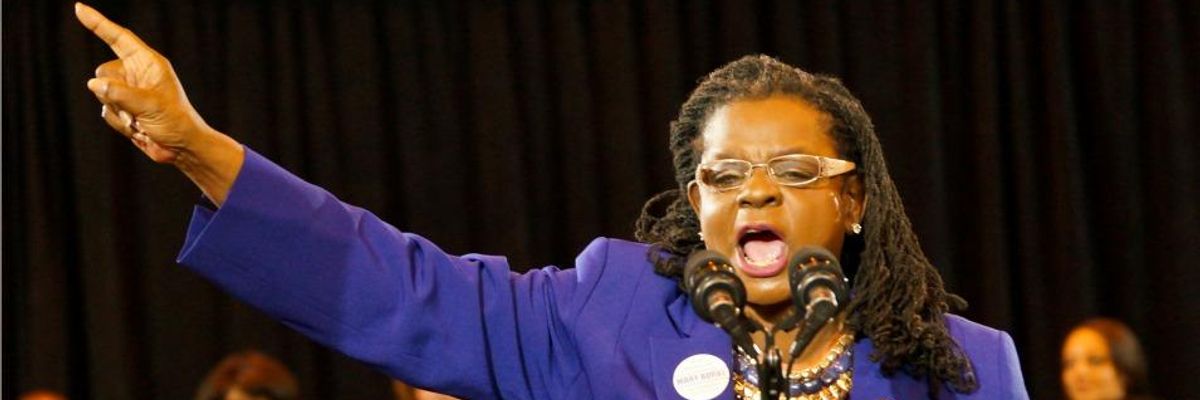A Wisconsin congresswoman, "sick and tired, and sick and tired of being sick and tired, of the criminalization of poverty," plans to introduce a bill requiring drug tests for the rich before high-dollar tax deductions are approved.
U.S. Rep. Gwen Moore, a Democrat from Milwaukee, told the Guardian in an interview Wednesday that her initiative was inspired by fellow Wisconsinite Paul Ryan's new "anti-poverty" plan, unveiled last week in front of a Washington, D.C. drug treatment center. At the time, Moore denounced that proposal as "a series of discriminatory policies meant to stigmatize the most vulnerable among us."
She said to the Guardian this week: "When he stood in front of a drug treatment center and rolled out his anti-poverty initiative, pushing this narrative that poor people are drug addicts, that was the last straw."
Indeed, Moore wrote in an op-ed last year:
We don't drug-test wealthy CEOs who receive federal subsidies for their private jets, nor do we tell Pell Grant recipients which degrees to pursue. We don't dictate how senior citizens should spend their social security checks, nor do we force judges or public officials to prove their sobriety to earn their paychecks. Attaching special demands to government aid exclusively targets our country's most vulnerable individuals and families. The implication that those battling poverty are more susceptible to substance abuse is as absurd as it is offensive, and forcing people to choose between feeding their families and protecting their constitutionally protected rights is disgraceful.
In turn, Moore plans to introduce on Thursday the "Top 1% Accountability Act," which the Guardian explains "would force taxpayers with itemized deductions of more than $150,000--which, according to 2011 tax data compiled by the IRS, would only be households with a yearly federal adjusted gross income of more than $1m--to submit to the IRS a clear drug test from a sample no more than three months old, or take the much lower standard deduction when filing their taxes."
Moore said: "We're not going to get rid of the federal deficit by cutting poor people off [Supplemental Nutrition Assistance Program, or] SNAP. But if we are going to drug-test people to reduce the deficit, let's start on the other end of the income spectrum.
"We might really save some money by drug-testing folks on Wall Street," she said, "who might have a little cocaine before they get their deal done."
As the Guardian notes, "Most people--including those with high incomes, who qualify for far more deductions and credits than the average person--just don't 'see' tax deductions as a subsidy similar to those given to low-income people in the form of benefits."
But Moore, a mother and grandmother who has spoken about how social safety net programs helped her family rise out of poverty, wants people to know: "The benefits we give to poor people are so limited compared to what we give to the top 1%," she said. "It's a drop in the bucket."
Meanwhile, a ThinkProgress survey of the 10 states that now have drug-test-for-benefits programs in place, publicized earlier this year, "found that they continue to be expensive and not especially effective. All told, states spent another $850,909.25 on the testing regimes in 2015 to uncover just 321 positive tests--in more than one state, none at all."

